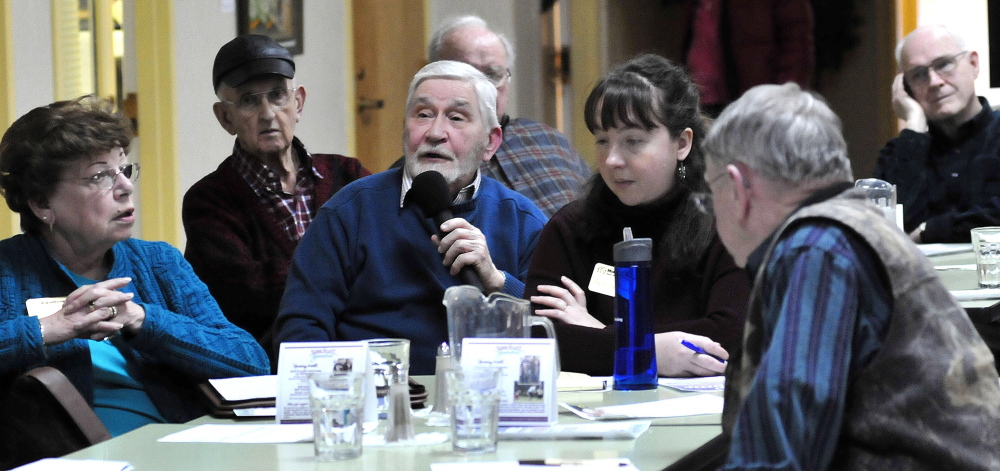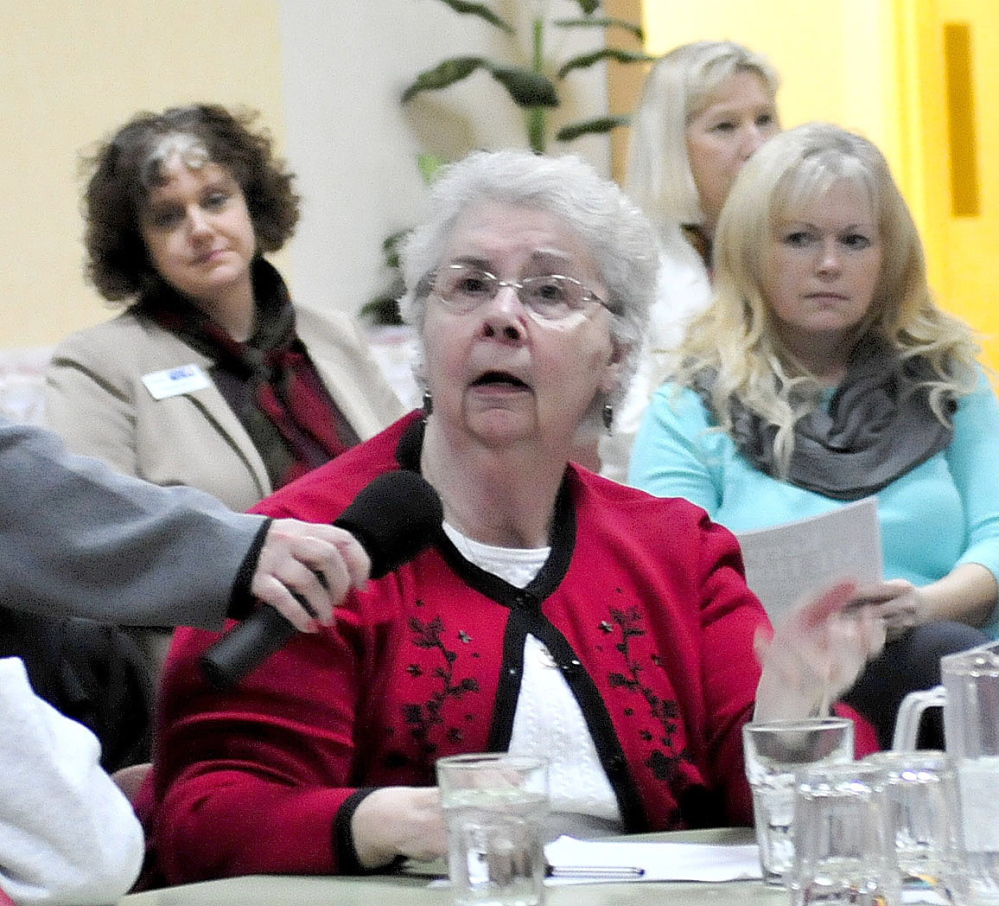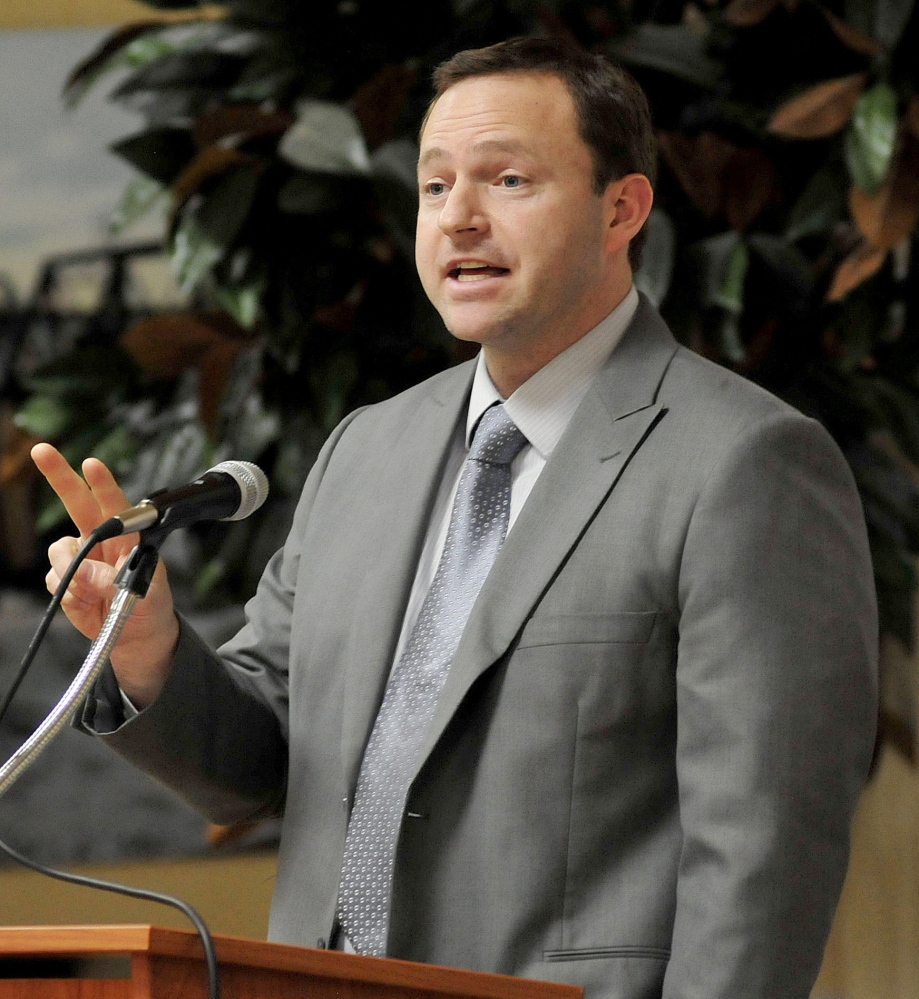WATERVILLE — One woman said she lives on a fixed income, her rent increased more than 10 percent in the last year and she does not know to whom to turn for help.
Another said affordable housing seems available for really poor people, but those who have a little money don’t qualify.
The seniors who attended a forum Tuesday afternoon at Senior Spectrum’s Muskie Center asked many questions of House Speaker Mark Eves, D-North Berwick, who is traveling the state to hear from residents, community leaders, direct care workers and others as he touts an initiative designed to help keep seniors in their homes for as long as possible. He also hopes to create 1,000 affordable housing units for seniors in all of the state’s 16 counties through a $65 million bond, increase the Medicaid reimbursement rate for home health workers and expand property tax credits for seniors.
More than 50 people – including Reps. Catherine Nadeau, D-Winslow, and Thomas R.W. Longstaff, D-Waterville – attended the forum sponsored by Spectrum Generations, Inland Hospital and Lakewood Continuing Care Center.
RISING COSTS, FIXED INCOMES
Lori Hyland of Readfield asked why officials were advocating for property tax relief as opposed to a tax cap. She said she bought her home in 1999, when the tax rate was $11 per $1,000 of valuation, and now the tax rate is more than $18 per $1,000.
“For seniors with a fixed income, I think that’s astronomical,” she said.
Eves said various solutions will be discussed as part of his proposal, including tax deferments and tax credits.
“All of that is going to be part of the conversation,” he said.
Mary Derosier, retired executive director of the United Way of Mid-Maine Inc. who now is a social worker in a rehabilitation facility, said the most difficult problem such facilities face is getting people home in a safe environment with support they need, including care workers. Insurance companies refuse to pay, yet seniors deserve to be in their homes if that is what they want, she said.
“Somebody needs to take a hard look at this issue,” she said.
Eves said he couldn’t agree more and that is why it’s important that direct care workers receive pay increases. Susan Roy, executive director of Hospice Volunteers of Waterville Area and a social worker who formerly worked with seniors in their homes, said she found a lot of seniors preferred to live at home.
“I think it’s really a shame that we don’t have the services in place to keep them there,” she said.
Eves has held several such forums around the state to discuss his bills to help seniors. His bill package, called Keep ME Home, presents an opportunity for Maine and for the state to be a leader in the nation, he said.
“I think these are some of the most important conversations we are having in the state right now,” he said.
A Portland Press Herald/Maine Sunday Telegram investigative series, The Challenge of Our Age, that ran in 2013 and 2014 uncovered shortages in senior housing, home care, long-term care and other areas that threaten to cripple the state economically and socially as its senior population grows.
Maine is the oldest state in the nation when measured by average age of the population, and 50 people turn 65 every day, Eves said, adding that he has been knocking on doors for six years and listening to people’s stories.
“One of the stories that I hear over and over and over and over is that ‘property taxes are too high, I’m scared to death I can’t pay my bill, and I’m going to have to move,’ ” he said.
Direct caregivers have not had a raise in about 10 years, he said. Legislators from both parties are discussing how to attract and maintain workers, and over the last 18 months, they have met with representatives of businesses, higher education, municipal government, direct service agencies and financial institutions to discuss the issues and identify community-based solutions, according to Eves.
“We have all come together to talk about how are we going to address this challenge,” he said.
The bills are being revised and will be referred to committees, and it is important for people to show up at hearings to show support for them, he said. He also urged people to write to and talk with their legislators about the effort.
SEEKING POLITICAL PROGRESS
Susan Giguere, president and chief executive officer of Waterville-based Care & Comfort, asked how people who can’t go to Augusta can follow what’s happening with the bills. People can listen to public hearings online, submit written testimony or comment through their local legislators, Eves said. Gerald Queally, chief executive officer of Spectrum Generations, said people also can sign up at his organization to receive emails and updates.
Lakewood employee Heather Merrow asked how soon any of the initiatives would be implemented if the bills pass.
If passed today, the housing piece still would have to go to voters, and then the Maine State Housing Authority would manage it, Eves said. Gov. Paul LePage has previously voiced general support for the $65 million plan, saying he’s “all in on that.”
“Honestly, the best-case scenario if we pass it today – it’s about two years out,” Eves said, adding that’s why the effort must be pushed now.
The property tax and direct care worker aspects could move much more quickly and have a much more immediate effect, he said.
Eves said many direct care workers earn $9 or $10 an hour, and he is not certain how much their pay would increase if an increase is approved, but that will be negotiated.
Giguere said her employees are hardworking men and women who dedicate themselves to their work. “They deserve this increase in wages,” she said.
Mollie Baldwin, chief executive officer of Farmingdale-based Home Care for Maine, said costly state mandates make it impossible to attract and keep workers and remain in business. Her company has 500 to 525 workers statewide who serve 800 to 1,000 clients in their homes who are over the age of 18, she said. She added that her company has received no increase in reimbursement rates for her workers for MaineCare or Medicare since 2005, when the rate was reduced by 14 cents.
“I’m working side by side with Rep. Eves,” she said.
Among those who attended Tuesday’s forum were Marjorie Goodwin, president of General Federation of Women’s Clubs, Maine; and Kathy White, Goodwin’s project chairman. The women said every state president chooses a state project for clubs within the state to work on, and they chose elder abuse prevention and awareness. They attended Tuesday’s event to learn as much as possible so they can educate club members in the state about the issues.
Send questions/comments to the editors.







Success. Please wait for the page to reload. If the page does not reload within 5 seconds, please refresh the page.
Enter your email and password to access comments.
Hi, to comment on stories you must . This profile is in addition to your subscription and website login.
Already have a commenting profile? .
Invalid username/password.
Please check your email to confirm and complete your registration.
Only subscribers are eligible to post comments. Please subscribe or login first for digital access. Here’s why.
Use the form below to reset your password. When you've submitted your account email, we will send an email with a reset code.